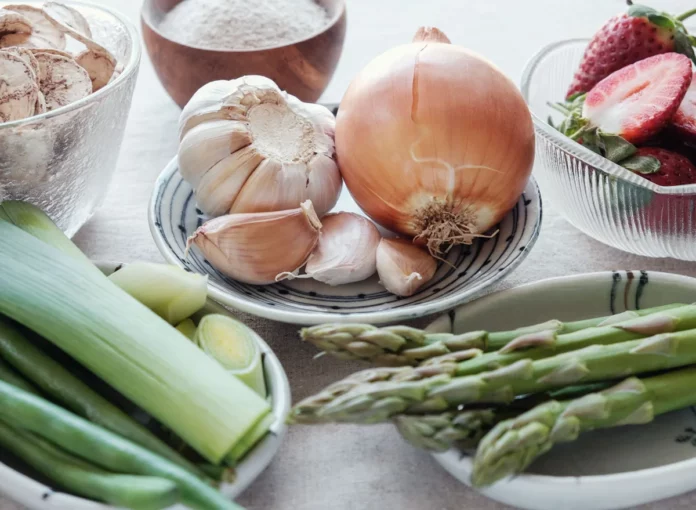Prebiotics are a type of food fiber that encourages beneficial bacteria in your digestive tract. You can find them in foods like vegetables, grains, legumes, and dairy products.
Prebiotic fibers include inulin, fructooligosaccharides (FOS), and pectin oligosaccharides. These fibers have the capacity to selectively and actively encourage the growth of lactic acid bacteria such as bifidobacteria and lactobacilli.
Flaxseed is a prebiotic-rich in fiber that aids digestion, regulates appetite, and decreases dietary fat absorption. Furthermore, its antioxidants may prevent cancer, reduce inflammation and regulate blood sugar levels.
Kombucha is another beneficial beverage that contains prebiotics. It contains live cultures, which add to the beneficial bacteria already present in your gut.
If you want to know more about prebiotics and why they are important for gut health, continue reading.
What Are Prebiotics?
Prebiotics are dietary fibers that nourish the beneficial bacteria in your gut. The beneficial bacteria help with digestion, elimination, immunity, and inflammation; on the other hand, bad bacteria can do harm to health and increase illness risk.
Prebiotics are indigestible to humans, but when fermented by healthy gut bacteria, they provide energy to these microorganisms and release short-chain fatty acids (SCFAs). SCFAs play an essential role in supporting your bacteria’s health as they increase their production of energy from a host.
Prebiotics come in various forms, but the two most widespread are fructooligosaccharides and oligosaccharides. These can be found in certain fruits and vegetables like garlic, onions, asparagus, bananas, Jerusalem artichokes, and chicory greens.
Why Are Prebiotics Good For Gut Health?
Our bodies contain trillions of bacteria that can do great or terrible things. In a healthy person, the beneficial bacteria outnumber the harmful ones two to one.
Your gut microbiome, composed of beneficial bacteria, helps you stay healthy, strengthens your immunity, and lowers the risk of certain diseases. But for these beneficial microbes to thrive, food must be provided.
For the beneficial bacteria to grow and thrive in your gut, prebiotics is required. These compounds can alter the composition of the organisms in the gut bacteria, thereby helping them grow in your gut.
Prebiotics are foods that promote the growth of beneficial gut bacteria. You can read more about it in this Bioma Review. Not only do they boost your immunity, but they may also prevent inflammatory bowel disease from taking hold.
Many cultures around the world have long recognized the benefits of these foods and incorporated them into their diets. Studies have demonstrated that they support a healthy microbiome and lower the risk for chronic illnesses like diabetes, obesity, and autoimmune diseases.
However, some individuals may be unable to digest these prebiotics, and it is recommended that they speak with their doctor before adding them to their diet. This is especially true if they have small intestinal bacterial overgrowth (SIBO) or a FODMAP intolerance.
Prebiotics offer numerous advantages to our health, but the primary purpose is to increase beneficial gut bacteria. When this occurs, it leads to improved immunity, better digestion, and elimination, improved moods, as well as increased nutrient absorption.
How Can Prebiotics Improve Gut Health?
Our bodies are home to trillions of bacteria that play an essential role in our well-being. These beneficial microorganisms in your gut help digest food, produce vitamins and support immunity. But, like all living things, they require food to grow and flourish. Prebiotics are the fuel for your gut bacteria.
Consuming a diet rich in fiber and prebiotics can help maintain and increase the diversity of your gut bacteria, which are vital to overall well-being. Furthermore, having a balanced microbiota may reduce your risk for various chronic illnesses.
Food sources that provide prebiotics are plentiful. Bananas, berries, barley, chicory, whole wheat, onions, garlic, and leeks all contain high levels of resistant starch, an effective form of prebiotic fiber.
For even greater benefits, take a prebiotic supplement in the form of tablets or capsules. These supplements can be absorbed in the small intestine, where most of your digestive bacteria reside. If you have a compromised or damaged digestive tract, taking these supplements may help restore a healthy balance of bacteria and reduce inflammation.
Best Natural Prebiotics to Improve Gut Health
Here are some best natural prebiotics that can help to improve your gut health.
1. Asparagus
One of the best natural prebiotics is asparagus. It contains both soluble and insoluble fibers, as well as fermentable fructans that nourish beneficial bacteria in your digestive tract for improved gut health.
2. Beans
Beans also contain prebiotic fiber and resistant starch, both of which are beneficial to gut microbes. The fiber in beans promotes gastrointestinal motility, while resistant starch is a carbohydrate that can be readily absorbed by gut bacteria for improved digestive health.
3. Garlic
Garlic is packed with prebiotics, making it an ideal choice for improving gut health. It contains inulin and FOS, which can support immunity, nourish beneficial bacteria, and facilitate digestion.
4. Apples
Apples are an excellent source of prebiotic fiber, which has been demonstrated to promote the growth of beneficial bacteria in your gut. This is essential for optimal digestive health as well as weight loss and immunity.
5. Onions
Onions are not only delicious, but they also contain a substantial amount of prebiotic fiber. This fiber feeds your gut bacteria and encourages them to produce short-chain fatty acids, which reduce inflammation in your digestive system.
Conclusion
You’ve likely heard about prebiotics and their beneficial effects on gut health, but you may not be sure what exactly they are. Prebiotics are simply plant foods that encourage good bacteria growth in your intestines. Prebiotic foods like vegetables, fruits, and legumes are excellent sources of fiber that can help in improving digestive health. Other probiotic-rich foods include garlic, onions, leeks, and chicory root. All of these also have antioxidants that promote the growth of beneficial bacteria in your gut.


